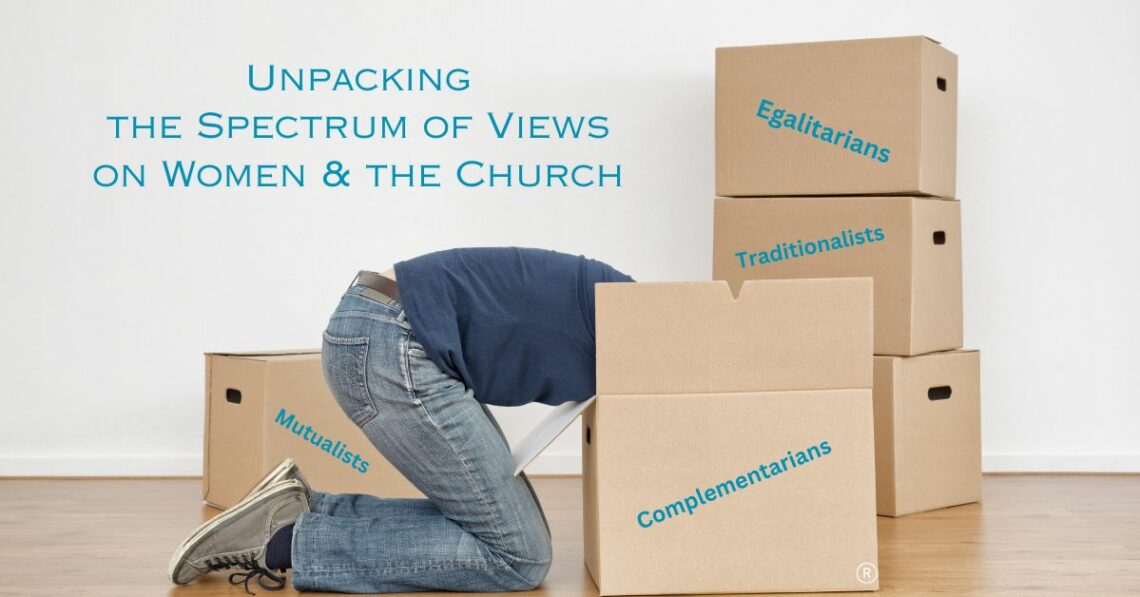
Unpacking the Spectrum of Views on Women and Church Leadership
Authoritarian, Libertarian, the Left, the Right…political polling data of United States voters reflects a broad spectrum of beliefs about organizational leadership and governing policies. Similarly, but in a different context, Christians hold a spectrum of beliefs on what the Bible teaches about women and their pastoral leadership.
If you were polled today, how you answer key questions about what women can do in the church, i.e. be a pastor, deacon, elder, teach men, perform baptisms, serve communion, will reveal your theological framework of women and leadership. Exemplary scholars and theologians who hold to the essentials of the faith, have a high view of Scripture, and have deeply studied the Bible and church history about women and the church land in different “camps.”
The Spectrum of Views About Women
Where do your beliefs fall on the spectrum of Christian views about women? Are you a traditionalist, in the complementarian camp, or an egalitarian? Perhaps your view is best categorized as “unsure.” If unsure, you’re not alone because many believers, including many pastoral leaders, haven’t studied what the Bible says about women, how Bible stories of women inform us, and what Bible women’s words reveal about God and humankind.
Keep reading as I unpack the spectrum of views on women and church leadership, whether for a refresher or because you desire to learn and understand. I’ll begin with the traditionalists’ view.
Traditionalists
The traditionalist viewpoint, not to be confused with the view held by most complementarians, teaches that God created in his image only men, not women; and that women image God indirectly via men. Therefore, men are ontologically (by nature) superior to women. They believe the divine design is for females to function under a male hierarchy. In addition, the traditionalist view interprets the Fall (Gen 3:16) as teaching that women are more easily deceived than men.
Similarities Between Complementarians & Egalitarians
Before defining the two major views—complementarian and egalitarian—it is important to highlight their similarities. While egalitarians and complementarians arrive at different conclusions on women’s functioning in the home and the church, both groups believe in the divine inspiration of the Scriptures. Both groups affirm that God created men and women with ontological equality (equality in their being), and created humankind in his image. They agree that women and men receive the same spiritual gifts. In addition, each camp acknowledges sex (male/female) differences—in other words, they affirm their differences. Finally, both views attest to the complementarity of the sexes in the church and family.
I’ll now define in broad terms the complementarian and egalitarian views.
Complementarians
The complementarian “view” is not one view. Complementarians hold a wide range of views within orthodox Christianity. Overall, most complementarians’ views differ in three main ways: (1) how they define authority, (2) the meaning they assign to the New Testament Greek word kephalē translated as “head,” and (3) the boundary lines in the church that define where women may publicly teach and lead.
While agreeing that both sexes are made in God’s image and are equal (in nature) before God, complementarians believe the Bible teaches “differentiated roles” for men and women. The belief in female and male “roles” is based on Bible creation stories (Gen 1:27; 2:18–23). These “roles” are defined with an ideal masculinity and ideal femininity—a “biblical pattern of mature manhood and mature womanhood.”[1]
The most restrictive complementarian view supports male hierarchy in spiritual and secular realms—all men are designed by God to lead. Regarding female submission—all women submit to all men. Complementarians falling in the middle range hold to varying degrees of male authority over females, including those who believe only in a husband’s authority over his wife as her “head.” Finally, the most unrestrictive view of women within the complementarian camp rejects a hierarchy of men over women, including in marriage. Instead, a wife voluntarily submits to her husband. Motivated by love, a husband rightly acts with self–giving love toward his wife.
The Bible verse frequently cited as the basis for a complementarian theology of women is 1 Timothy 2:12, “But I do not allow a woman to teach or exercise authority over a man. She must remain quiet.”[2]
Egalitarians
Egalitarians believe the Bible teaches the equality of men and women. In their understanding of the creation stories, the male and female “shared authority, responsibility, and purpose,” but the Fall precipitated women’s oppression.[3] While affirming the inherent biological differences between the sexes, egalitarians do not see differences in “roles.” Therefore, they reject limiting women’s gifts, abilities, and callings and “any created or otherwise God-ordained hierarchy based solely on sexual difference [emphasis theirs]” in the home or church.[4]
The editors for the newest edition of the book Discovering Biblical Equality define biblical equality as: “Women and men are made equally in God’s image and likeness (Gen 1:27), equally fallen (Rom 3:23), equally redeemable through Christ’s life, death, and resurrection (John 3:16), equally participants in the new-covenant community (Gal 3:28), equally heirs of God in Christ (1 Pet 3:7), and equally able to be filled and empowered by the Holy Spirit for life and ministry (Acts 2:17).”[5] Some egalitarians prefer the term “mutualist” as it best describes their theology of women.
Egalitarians’ capstone Bible verse is Galatians 3:28, “There is neither Jew nor Greek, there is neither slaves nor free, there is neither male nor female—for all of you are one in Christ.”
Other Theological Terms: Mutualist and Hierarchical
Some scholars reject the labels of complementarian and egalitarian because they question whether either position fully reflects the biblical view. Some of these scholars include Michelle Lee-Barnewall, author of Neither Complementarian Nor Egalitarian, Lucy Peppiatt, author of Rediscovering Scriptures Vision for Women, Andrew Bartlett, author of Men and Women in Christ, and Christa McKirland, author of God’s Provision, Humanity’s Need: The Gift of Our Dependence. Lee-Barnewall advocates for an alternative viewpoint because she believes “the topic cannot be completely defined by either the complementarian or egalitarian viewpoint.” Peppiatt prefers the terms “hierarchicalists” rather than complementarian, and “mutualists” rather than egalitarian because she sees her preferred terms are more reflective of true theology. Peppiatt and McKirland are self-described “mutualists.”
I hope these descriptions of the various Christian theologies of women are helpful to you. It is a complex topic, yet worthy of attention. In my self-paced online course Theology of Women Academy, I serve as an educational guide for students to sift the scriptures and church history to move from uncertainty to confidently equipped to form their views on women and the church.
Your view of women will influence many relationships, including in the home, church, and community. What you believe about women and the church matters!
[1] John Piper and Wayne Grudem, eds., Recovering Biblical Manhood and Womanhood, 54.
[2] Sarah Sumner writes that 1 Timothy 2:12 serves as a complementarian “boss verse” (a term she coined), in other words, this Scripture verse takes priority over other verses because it serves as a “guiding hermeneutic” for their theology of women in the church.” Similarly, she writes that the “boss verse” egalitarians prioritize is Galatians 3:28, “There is neither Jew nor Greek, there is neither slaves nor free, there is neither male nor female—for all of you are one in Christ.” In Sarah Sumner, Men and Women in the Church: Building Consensus on Christian Leadership (Downers Grove, IL: IVP Books, 2003), 127–128.
[3] Margaret Mowczko, “The Biblical Basis of Egalitarianism,” July 27, 2022, https://margmowczko.com/biblical-case-for-egalitarianism/
[4] Ronald W. Pierce, Cynthia Long Westfall, eds., Discovering Biblical Equality, 2.
[5] Pierce and Westfall, Discovering Biblical Equality,




